|
|
|
Sort Order |
|
|
|
Items / Page
|
|
|
|
|
|
|
| Srl | Item |
| 1 |
ID:
171944
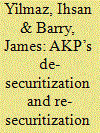

|
|
|
|
|
| Summary/Abstract |
This article evaluates the Turkish state’s relations with the Alevi community through a securitization theory framework. It first examines the issue in its historical context, comparing Kemalist and more recent policies, and highlights that despite the ideological differences between the previous governments and the current AKP government, for Alevis much has remained the same. It then turns to the securitization of the Alevis by successive regimes, and demonstrates that the period of de-securitization begun under the AKP did not end the practice, and that political expedience led to the issue’s re-securitization.
|
|
|
|
|
|
|
|
|
|
|
|
|
|
|
|
| 2 |
ID:
188970
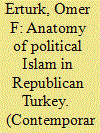

|
|
|
|
|
| Summary/Abstract |
The Milli Görüş political Islamic movement and the first political parties under its banner were founded and dominated by the Naqshbandis. Numerous scholars have so far suggested that political participation has led these groups to transform and moderate their former Islamist views over time. This study examines this possibility by scrutinising how Naqshbandi and Milli Görüş leadership perceive the state, essential political institutions such as the legislature, political parties, opposition, elections, and independent media, together with some defining issues in Islam such as jihad, excommunication, and al-wala’ wa-lbara’ (loyalty and disavowal). In particular, the study seeks to uncover how the Naqshbandi theological background has been turned into a political Islamist ideology through the influence of two important Naqshbandi shaykhs, Mehmed Zahid Kotku (1952–1980) and Mahmud Es’ad Coşan (1980–2001), and two leading Naqshbandi-affiliated Milli Görüş leaders Necmettin Erbakan and R. Tayyip Erdoğan to reveal if/to what extent Islamists’ participation in politics has transformed their Islamist views. As a methodology, content analysis and political discourse analysis have been used. The findings demonstrate a continuity of Islamist Naqshbandi thought in Milli Görüş leadership and that political participation has neither ‘democratised’ nor ‘moderated’ these parties and their radical Islamist thoughts.
|
|
|
|
|
|
|
|
|
|
|
|
|
|
|
|
| 3 |
ID:
189831
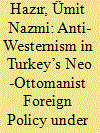

|
|
|
|
|
| Summary/Abstract |
After 2013, Turkey’s foreign policy has been noted for neo-Ottomanist
rhetoric and anti-Western discourse, which resulted in the deterioration
of relations with the West. To disclose the patterns of anti-Westernism
in Turkish foreign policy, this paper analyzes official speeches of Turkish
President Recep Tayyip Erdoğan given at international meetings and
events from 2014 to 2021. Based on critical constructivism, which
underlines the co-constitutive relationship between identity and
foreign policy, and the role of the Other in identity construction,
this article demonstrates how the Western Other has been used by
Erdoğan in building Turkish Ottoman identity. This article articulates
the anti-Western notion of neo-Ottomanism and argues that Erdoğan’s
anti-Western discourse bears the Islamic undertone and relies on the
delineation of the Turkish-Ottoman Self from the Western Self.
|
|
|
|
|
|
|
|
|
|
|
|
|
|
|
|
| 4 |
ID:
192273
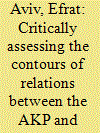

|
|
|
|
|
| Summary/Abstract |
In Turkey’s increasingly authoritarian context, which minimizes any serious chance of making political gains, challenging common conceptions of political power may expand our understanding of power dynamics. This article draws upon historical perspectives to track the power dynamics and political relations of religious movements inside and outside the legitimate forms of politics in Turkey. It provides insights into how political power is being reframed through religious movements and vice versa. It also examines the history of Turkey’s religious movements and their relationship with the government since 1925. It also discusses how the state-religion relationship has changed since the rise of the Justice and Development Party (Adaletve Kalkınma Partisi, AKP) and the 2016 coup attempt. It presents a case study of Furkan Vakfı and its leader, Alparslan Kuytul, who vehemently opposed the government and is now regarded as a threat by Erdoğan and the AKP.
|
|
|
|
|
|
|
|
|
|
|
|
|
|
|
|
| 5 |
ID:
183730
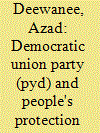

|
|
|
|
|
| Summary/Abstract |
This article explores the construction of the Syrian Kurdish Democratic Union Party (PYD) and the People's Protection Units (YPG) in Turkish official discourse. In the article, I employ critical discourse analysis (CDA) to analyze written texts produced during the years 2014–2019 that reflect the position of the Turkish authorities. The article sets out the main narratives that construct the PYD and YPG as terrorist organizations and posits them as a threat to both Turkey and the international community. The analysis reveals that these narratives serve the purpose of delegitimizing the PYD and YPG and legitimizing Turkish military operations and violations against Syrian Kurds. It highlights that the Turkish official position regarding the PYD and YPG is driven by two ideological factors: first, the influence of Kurdish autonomy in Syria on the action of Kurds in Turkey, and second, the barrier that the PYD and YPG have created against the Islamist agenda of Turkey's Justice and Development Party (AKP) in Syria.
|
|
|
|
|
|
|
|
|
|
|
|
|
|
|
|
| 6 |
ID:
149124
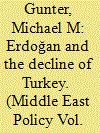

|
|
|
|
|
| Summary/Abstract |
Recep Tayyip Erdoğan — Turkey's current president (elected 2014) and former prime minister (2003–14) — in his first decade in power, won three parliamentary elections by ever-larger shares of the popular vote because he had helped to build Turkey into a burgeoning economic powerhouse and a moderate Islamic democracy. In the past half-decade, however, despite winning Turkey's first popular election for president in August 2014 and presiding over another great parliamentary victory in November 2015, Erdoğan's increasing authoritarianism has helped precipitate the disastrous decline of the nation as well as his own inevitable fall from power. What happened, and what lessons can be gleaned? Can Turkey's decline be reversed and its progress revived?
|
|
|
|
|
|
|
|
|
|
|
|
|
|
|
|
| 7 |
ID:
183732
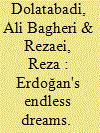

|
|
|
|
|
| Summary/Abstract |
After the Justice and Development Party (AKP) rose to power in 2002, Turkey's Middle East policy underwent a radical change. Erdoğan's readings of the Arab Spring events are a vivid example of Turkey's new foreign policy. In the last months of 2019 and 2020, Turkey took two other important steps that have attracted the attention of the international community: engagement in Operation Peace Spring in northern Syria without UN Security Council authorization, and steps to reach an agreement with the Libyan government on oil and gas exploration in the Mediterranean in tandem with sending troops to Libya. Turkey's recent actions, which violate international law and UN resolutions, raise several questions: what changes have taken place in Turkey's foreign policy? What are its core drivers and main components? And what results will the new policy deliver in the future? We argue that Turkey's behavior conforms to the principles of offensive realism. The shift in Turkey's foreign policy and the trend toward offensive realism are rooted in the 2011 Arab Spring and subsequent events in the Middle East. The failed coup of 2016 accelerated these changes and pushed them in new directions. Turkey is now seriously aiming to maximize its power, particularly in the politico-military field, which could increase tensions in the sensitive region. We submit that Turkey cannot be guided by offensive realism in the long term, however.
|
|
|
|
|
|
|
|
|
|
|
|
|
|
|
|
| 8 |
ID:
186525
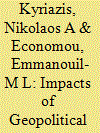

|
|
|
|
|
| Summary/Abstract |
This paper sets out to explore whether the Turkish geopolitical uncertainty exhibits significant linkages with fluctuations in the Turkish lira (TRY) values against other currencies. The period examined covers the Erdoğan administration (March 2003 up to the present). The innovative geopolitical uncertainty index by Caldara and Iacoviello and modern GARCH methodologies are adopted in order to explore how geopolitical risk influences currency values and the overall economy during this turbulent period. Econometric outcomes reveal that geopolitical uncertainty leads to devaluation of TRY against the US dollar, the Swiss franc and the Swedish krona but in a non-significant manner whereas mixed results emerge concerning the impacts of macroeconomic or financial variables.
|
|
|
|
|
|
|
|
|
|
|
|
|
|
|
|
| 9 |
ID:
193258
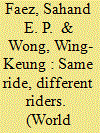

|
|
|
|
|
| Summary/Abstract |
Mainstream international relations definitions commonly assume that states are identical units in a constant state of competition for survival to increase their power. Yet, such a one-sided approach fails to fully consider that the internal structures and contexts of states at different times and under different leaders exert considerable effects on how states act in the international arena and on the foreign policies that shape their identities, priorities, and thus relations with other states. We begin by questioning such theoretical assumptions and then apply a more appropriate reformulation to the case of Turkey's changing trade policy with the European Union (EU). Examining Gül's administration (2007–2014) and Erdoğan's (2014–2020), we look at whether a change in Turkish leadership resulted in a significant change in trade policy and led to a change in the dynamics of its foreign relations approach. Turkey's relations with the members of the EU are assessed (via panel data estimations) as the volume of trade between Turkey and EU members. The data consists of 25 European states’ GDP, Exchange Rate, and Inflation Rate for 2000–2020. We find a significant difference in Turkey's behavior in terms of trade with the EU members between the two administrations under study. This suggests the need to rethink some central theoretical assumptions in certain mainstream international relations perspectives.
|
|
|
|
|
|
|
|
|
|
|
|
|
|
|
|
| 10 |
ID:
174019
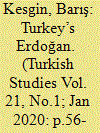

|
|
|
|
|
| Summary/Abstract |
Political leaders appeal to home audiences as well as ‘others’ beyond the state’s borders. Using leadership trait analysis, in the example of Turkey’s Recep Tayyip Erdoğan, this paper questions if and why a leader can exhibit different leadership traits and styles at home and away. The paper is concerned with how Erdoğan's leadership traits and style connect to Turkish foreign policy between March 2003 and May 2013. First, two profiles of Erdoğan are assessed from the interviews he gave to domestic and foreign press. The paper then reports Erdoğan’s profiles by distinguishing between different Western, Eastern, European, American, and Middle Eastern audiences. Based on these profiles, this paper argues that Erdoğan has two different profiles at home and away. Furthermore, it finds that Erdoğan’s profile from his foreign policy interviews with American news outlets stand out from his other profiles. Among other traits, Erdoğan’s task focus changes noticeably among audiences.
|
|
|
|
|
|
|
|
|
|
|
|
|
|
|
|
|
|
|
|
|